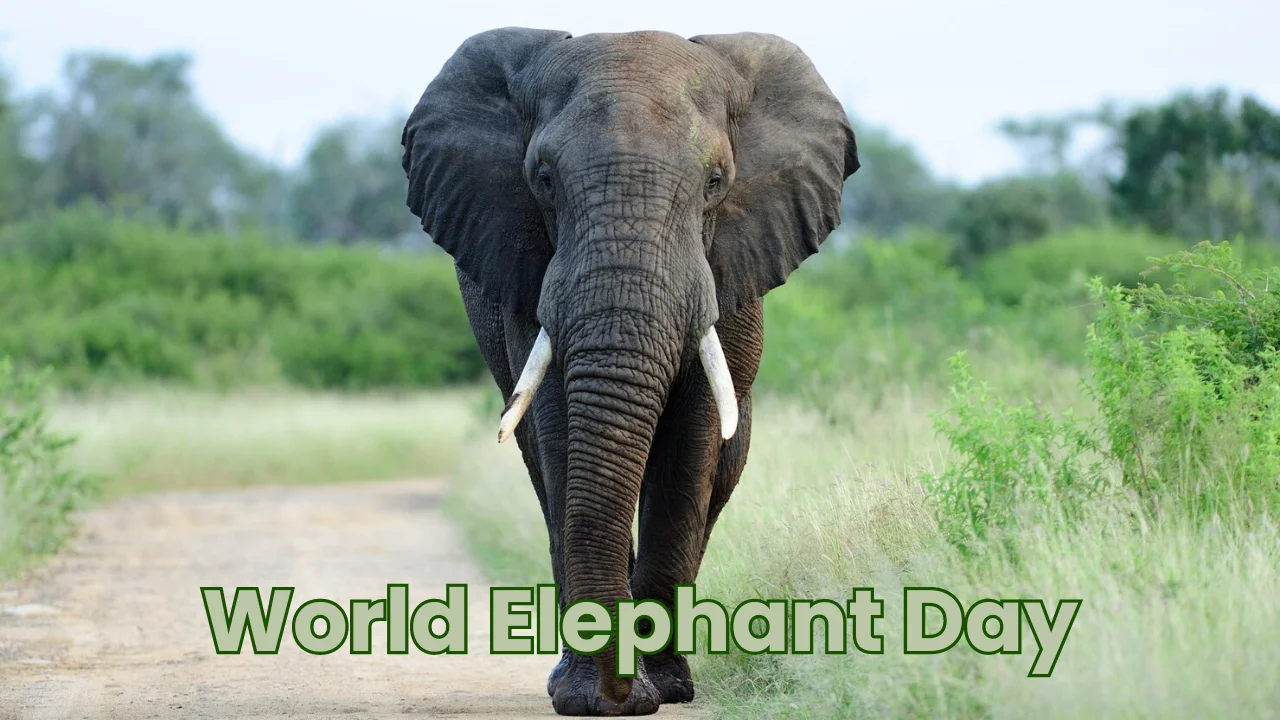World Elephant Day 2024
World Elephant Day, marked worldwide on August 12, holds great importance as it aims to raise awareness about the critical issues confronting elephants and to advocate for their safeguarding and preservation.
This day serves as a crucial forum to bring attention to challenges like habitat depletion, the illegal trade of ivory, conflicts between humans and elephants, and the pressing requirement for enhanced conservation endeavors. The objective of this occasion is to emphasize the significance of protecting these majestic beings for the well-being of generations to come and to inspire initiatives that contribute to their welfare and continued existence.
World Elephant Day Theme 2024
The official theme for World Elephant Day 2024 is “Personifying prehistoric beauty, theological relevance, and environmental importance”.
This theme underscores the importance of preserving natural habitats to ensure the survival of elephants. It highlights the urgency of addressing habitat conservation as a critical factor, especially in light of the declining elephant population. By focusing on habitat protection, the theme aims to create a sustainable environment where elephants can thrive, ensuring their survival for future generations.
World Elephant Day History
The World Elephant Day was co-founded on August 12, 2012, by Patricia Sims from Canada and the Elephant Reintroduction Foundation of Thailand, an initiative of HM Queen Sirikit of Thailand.
- Patricia Sims has remained at the forefront of World Elephant Day’s leadership since its inception.
- Over the years, this initiative has established partnerships with 100 elephant conservation organizations worldwide and has garnered the support of countless individuals across the globe.
- The active participation of millions of people in acknowledging World Elephant Day showcases the widespread love for elephants and the collective desire to contribute to their well-being.
World Elephant Society
- In November 2015, the World Elephant Society was established as a nonprofit tax-exempt 501(c)(3) public charitable organization.
- Its primary purpose is to provide support for the annual World Elephant Day campaign.
- Patricia Sims serves as its President and Executive Director.
- The organization’s vision is to continually expand its educational outreach each year, making it a central and integral part of its mission.
World Elephant Day Significance
This day is significant as it raises awareness about the plight of elephants and the need to protect them. Elephants are facing several threats, including habitat loss, poaching, and conflict with humans. Poaching is the biggest threat to elephants, and it is estimated that over 30,000 elephants are killed each year for their ivory tusks.
World Elephant Day is a day to celebrate the beauty and intelligence of elephants and to raise awareness of the challenges they face. It is also a day to call for action to protect elephants and ensure their survival.
Significance of World Elephant Day
- It raises awareness about the plight of elephants. World Elephant Day helps to raise awareness about the threats that elephants face, such as habitat loss, poaching, and conflict with humans. This awareness can help to encourage people to take action to protect elephants.
- It encourages people to take action to protect elephants. World Elephant Day encourages people to take action to protect elephants, such as donating to elephant conservation organizations, speaking out against the ivory trade, and choosing elephant-friendly products. These actions can help to make a difference for elephants and help to ensure their survival.
- It unites people in the fight to protect elephants. World Elephant Day unites people from all over the world in the fight to protect elephants. This unity can help to amplify the voice of elephant conservationists and can help to put pressure on governments and organizations to take action to protect elephants.
- It celebrates the beauty and intelligence of elephants. World Elephant Day celebrates the beauty and intelligence of elephants. This celebration can help to remind people of the importance of elephants and the need to protect them.
It is a significant day that raises awareness about the plight of elephants and the need to protect them. By taking part in any of the activities listed above, you can make a difference for elephants and help to ensure their survival.
Why Elephants are important?
Elephants are magnificent creatures that play a crucial role as gardeners of forests and savannas. They have a unique ability to help plants germinate by passing seeds through their digestive system. Many plants rely on elephants to facilitate their growth in this way. Additionally, elephants hold great allure for tourists worldwide, attracting millions of travelers who contribute to the tourism industry in the countries where these majestic animals reside. This not only generates income but also creates job opportunities within the tourism sector.
Why they are threatened by illegal trade?
The illegal poaching of elephants for their ivory remains a significant and troubling issue.
- In recent years, experts have estimated that a staggering number of around 100,000 elephants were killed between 2010 and 2012 alone.
- The demand for ivory tusks drives this poaching, with ivory being used for various products ranging from jewelry like bangles to religious artifacts and intricate carvings.
- The trade and sale of high-value ivory items have become major drivers behind the unlawful killing of elephants.
Regarding regulations, both African and Asian elephants are listed under CITES Appendix I, which indicates the highest level of protection. However, there are exceptions for certain populations of African elephants from Botswana, Namibia, South Africa, and Zimbabwe, which are listed in Appendix II. As per these regulations, international commercial trade in raw ivory is strictly prohibited. The aim is to curb the illegal ivory trade and protect these magnificent creatures from further harm.
Ivory Trade
In 1989, the Convention on International Trade in Endangered Species (CITES) imposed a worldwide ban on the ivory trade. However, despite this ban, the legal ivory trade persists in several countries, such as Japan, and the illegal black market trade remains active and profitable.
- Tusks are present in both male and female African elephants, whereas, in Asian elephants, only males have tusks. Interestingly, due to the impact of poaching, some female African elephants are now being born without tusks, a genetic mutation that has arisen as a response to the threat.
- The year 2013 marked a significant milestone, as it saw the highest quantity of confiscated ivory in the past 25 years.
- In May 2016, Kenya demonstrated its strong stance against the illegal ivory trade by conducting a historic event where it publicly burned 105 tons of ivory. This act represented the largest ivory burn in history and conveyed Kenya’s commitment to combatting the illegal trade and protecting elephants.
12th August 2024 Special Day
12th August carries ecological significance as conservationists worldwide mark World Elephant Day in 2024. Coinciding fittingly with the peak of monsoons, this commemorative occasion confronts escalating threats to both African and Asian elephant populations globally. The urgent timing provides a critical moment to galvanize preservation efforts and curb habitat loss before time runs out for the sagacious species nearing extinction. As wildlife activists unite across nations on this particular 2024 date, the message resonates clearly – securing elephants’ future maintains the balance of forests.
- Weekly Current Affairs 2025 PDF For Bank, SSC, UPSC Exams
- Unsung Heroes of India: 10 Unknown Freedom Fighters You Should Know
- 26 December Current Affairs 2023 in English
- Daily Current Affairs 2025, Check Today’s Current Affairs
- April Month Current Affairs 2024, Download PDF
- June Month Current Affairs 2024, Download PDF

Hello, I’m Aditi, the creative mind behind the words at Oliveboard. As a content writer specializing in state-level exams, my mission is to unravel the complexities of exam information, ensuring aspiring candidates find clarity and confidence. Having walked the path of an aspirant myself, I bring a unique perspective to my work, crafting accessible content on Exam Notifications, Admit Cards, and Results.
At Oliveboard, I play a crucial role in empowering candidates throughout their exam journey. My dedication lies in making the seemingly daunting process not only understandable but also rewarding. Join me as I break down barriers in exam preparation, providing timely insights and valuable resources. Let’s navigate the path to success together, one well-informed step at a time.






